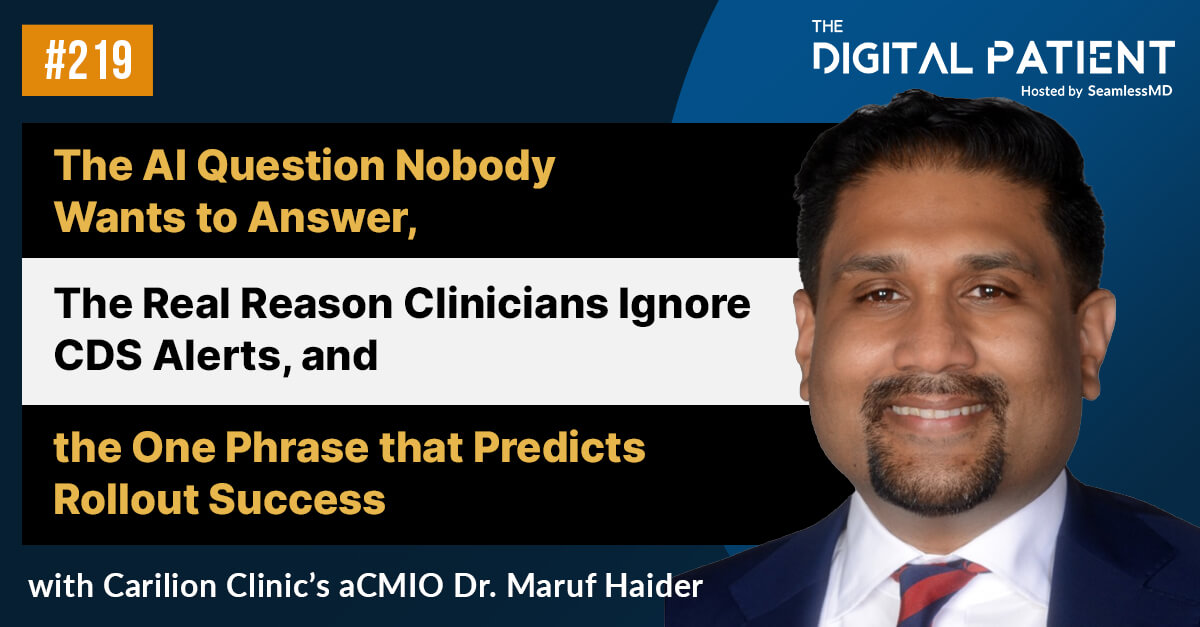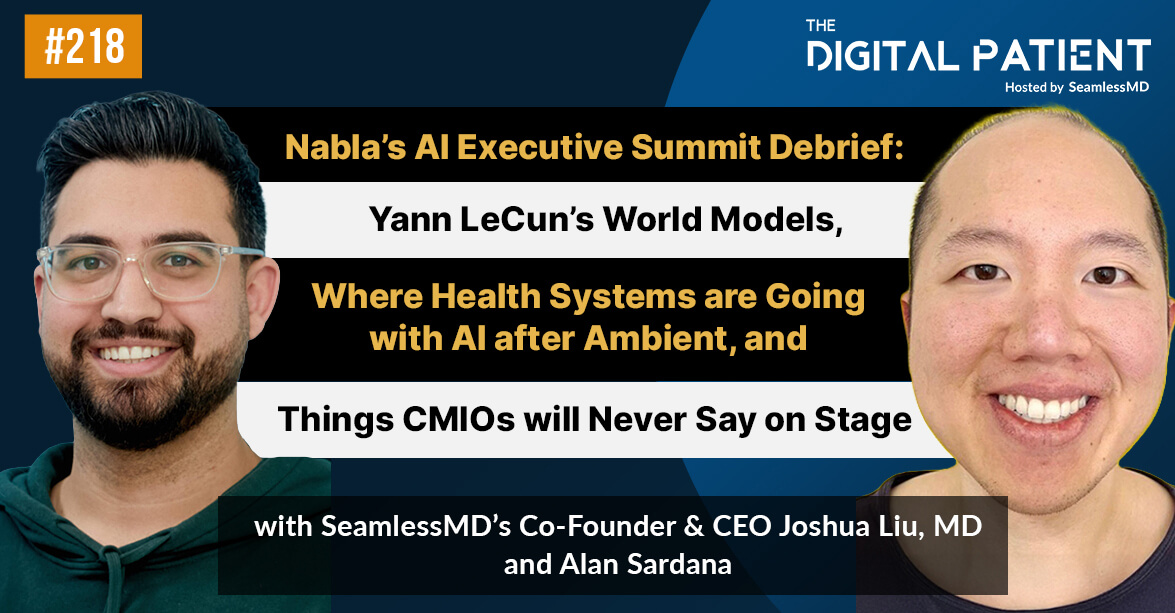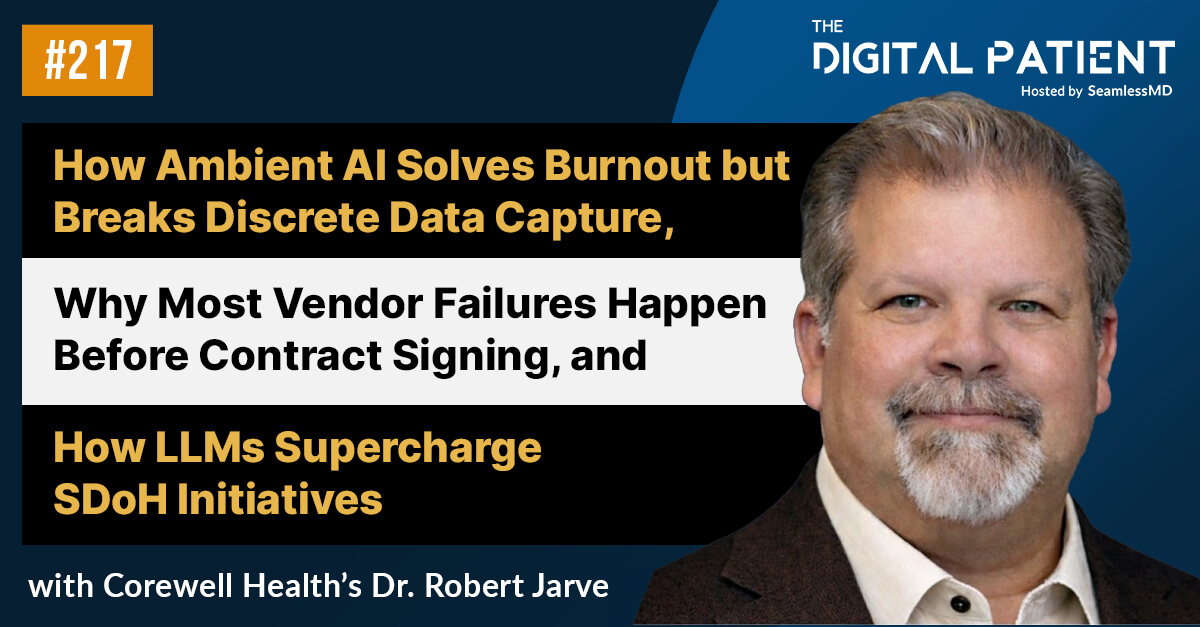Subscribe on: RSS | SPOTIFY | APPLE PODCAST | GOOGLE | BREAKER | ANCHOR
Audio:
Video:
In this episode of the SeamlessMD Podcast, Dr. Joshua Liu, Co-founder & CEO at SeamlessMD, and marketing colleague, Alan Sardana, chat with Dr. Roberta Schwartz, Executive Vice President & Chief Innovation Officer at Houston Methodist Hospital, about "Fostering an Innovation-First Culture & Developing a Digital Ecosystem to Engage Patients Across Borders".
See the full show notes below for details.
Guest(s):
Dr. Roberta Schwartz (@RobertaS_CIO), Executive Vice President & Chief Innovation Officer at Houston Methodist Hospital
Dr. Joshua Liu (@joshuapliu), Co-founder & CEO at SeamlessMD
Episode 64 – Show notes:
[0:00] Introducing Roberta Schwartz, PhD, Executive Vice President & Chief Innovation Officer at Houston Methodist Hospital;
[1:49] How Dr. Schwartz’s personal journey growing up around hospitals, undergoing gallbladder surgery, overcoming breast cancer, supporting a child with Rett syndrome, and consulting in healthcare formed a deep passion for improving healthcare and the patient experience;
[7:04] Why Dr. Schwartz moved from New York to Texas to join Houston Methodist Hospital for the opportunity to build out the cancer service line – drawing on her interest and personal experience battling cancer in the past;
[9:20] How the Houston Methodist “Center for Innovation” started organically through collaboration with digitally-obsessed individuals from different departments and how the team views failure as part of the learning process for success;
[12:40] Why Dr. Schwartz believes technology can help reduce friction for a patient throughout their experience interacting with their healthcare, highlighting the importance of technology providing a simple user experience with a sophisticated back-end;
[15:25] Why the innovation team at Houston Methodist round with the staff to collect direct feedback and to understand how to make significant improvements to workflow, processes and performance;
[18:20] How COVID-19 impacted Houston Methodist and required everyone to pitch-in in various ways, including the time when Dr. Schwartz drove a stretcher through the hospital without putting it into “steer”;
[20:00] Why Dr. Schwartz feels responsible to be a steward of the hospital as Houston Methodist has an ingrained culture of inclusivity where everyone is responsible for treating the hospital with respect as if it were their home (away from home);
[20:50] Why Dr. Schwartz was not surprised when Houston Methodist was the first in the nation to require the COVID-19 vaccine as the hospital has always focused on patient safety, quality and the pursuit of “better”;
[23:22] How Dr. Schwartz avoids implementing digital for the sake of digital by asking the question, “does this have a return on investment?”, understanding that ROI does not always mean dollars saved, but can also mean workflow improvements (saving staff time) and/or improving the patient experience;
[25:10] Why Dr. Schwartz focuses on shepherding ideas brought up by staff/patients instead of specific technologies to provide solutions for problems where there are points of friction;
[30:15] Why Dr. Schwartz was dubbed the “Incident Commander” at Houston Methodist for her organization skills and how she views the role akin to an orchestra conductor whose job it is to highlight particular instruments at different times;
[37:18] How Dr. Schwartz views their Digital Ecosystem as a puzzle without a picture map, where the obvious technologies such as scheduling technologies form the puzzle border and it's her job to figure out the rest of the puzzle;
[40:41] Why Dr. Schwartz believes “phy-gital”, the combination of physical and digital such as sensors are in their infancy and will mature over the next 5 years to provide proactive care combined with a maturing big data solution for predictive analytics;
[45:20] Why Dr. Schwartz believes fee-for-care in the future will be further personalized to quality and need, for e.g. a 5-minute gynecology virtual visit vs. a 1-hour neurology visit;
[48:00] Why Dr. Schwartz believes voice-technology is the future as it’s leveraging our most reliable form of communication, and how there are two schools of thought regarding voice data: 1) Using Natural Language Processing to identify and pull information into discrete EHR fields; and 2) Entering directly into discrete fields throughout the conversation;
Fast 5 / Lightning Round:
- What is your favorite book or book you’ve gifted the most?
“The Nine: The True Story of a Band of Women Who Survived the Worst of Nazi Germany” by Gwen Strauss
“The Presidents Club: Inside the World's Most Exclusive Fraternity” by Michael Duffy and Nancy Gibbs
“In the Garden of Beasts” by Erik Larson
- How has an apparent failure set you up for greater success?
“The little failures like sending an email to the wrong person… or big failures like realizing an action you took hurt somebody” - Would you rather have Super strength, super speed, or the ability to read people’s minds?
“Ability to read people’s minds”
- What is something in healthcare you believe that others might find insane?
“There’s a reason every soap opera has a hospital at the center… we’re all kind of crazy.”
- COVID-19 lockdown related – what is 1 hobby or activity you’ve gotten into since the pandemic?
“I don’t have any hobbies… I’ve done a lot to minimize the stuff I have at home… Cleaning.”
.svg)










.png)
